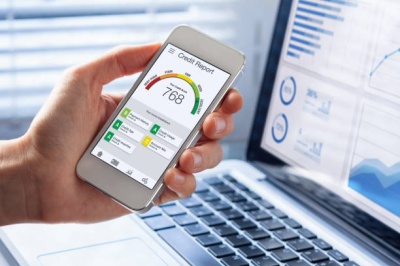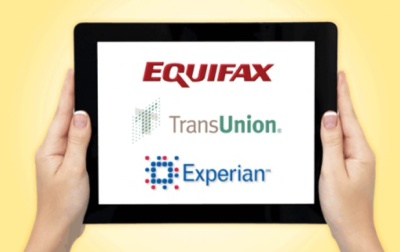
An Easy-to-Understand Guide To Your Credit Score And The Factors That Influence It

Are you planning to buy a house in the near future? Understanding what your credit score is and what factors influence it can give you a confidence boost when buying a home, plus arm you with knowledge if you need to dispute something.
Credit scores are a big factor when buying a home. They are used by mortgage lenders to determine if you’re at risk of defaulting on your loan and even how much they should charge you for the loan. Most consumers don’t really understand what influences their credit score, and even fewer know how lenders calculate the loan pricing. In this blog, we’re going to look at your credit score and the factors that influence it. The more you know, the more you can make a difference.
Five primary factors impact your credit score. Can you guess which ones have the most influence? Let’s uncover the facts. We’ll even throw in a few helpful tips…
Length Of Credit History
Length of credit history accounts for only 15% of your credit score. The longer you use credit responsibly, the better your score can be.
Tip: Even if you pay off an older credit card, keep the account open and use it occasionally.
Amounts Owed
The amount you owe on your credit accounts is the second largest contributor to your score. It accounts for 30% of your credit score. The best scenario is low "credit utilization" – using no more than about 20% of the credit available to you.
Tip: If you don't have money to significantly pay down debt right away, consider asking for a higher credit line on an existing account. When you make the request, ask the creditor to make a "soft inquiry" into your credit history, which will not ding your score, rather than a "hard inquiry," which could temporarily cost you some points.
Types of Credit In Use.png)
Types of credit in use accounts for only 10% of your credit score.
It helps your score to maintain a combination of three types of financing: revolving (credit cards), installment (student or personal loans), and secured (auto loans).
Tip: Don't run out and open an account just to have diversity! This is one of the least influential contributing factors.
New Credit
New credit also only accounts for only 10% of your credit score.
Newly established accounts and inquiries for new credit can lower your score. Fortunately, this factor has a relatively small impact.
Tip: Limit the number of new credit inquiries you make and accounts you open, particularly if you're preparing to seek a mortgage or other large loan soon. If you're shopping around for the best deal on new credit, do so in a short amount of time to minimize the impact of multiple queries.
Payment History
Last but certainly not least, pay history accounts for a whopping 35% of your credit score!
The timeliness of your payments is the single biggest contributor to your credit score. It's important not only to make your payments but also to make them by their due dates.
Tip: Have a system in place to assure your bills are always paid on time. Set up automatic withdrawals where appropriate. Keep a cash reserve account to cover payments during possible interruptions to your income.
Bottom Line
Managing your credit is important to obtaining the best terms any time you need to borrow. Best practices may seem counterintuitive, so follow our tips to keep your credit shining. And remember, good habits create good credit. Have questions? Don’t be afraid to reach out to us! We are happy to help.
Helpful Resources

Protecting your credit score during this time is extremely important. We encourage you to be proactive in monitoring your credit, staying on top of personal finances, and using resources that are available to you. The three major U.S. credit reporting agencies Equifax, Experian and TransUnion are making it easy for consumers to do just this! They are currently offering consumers free weekly credit reports through April 2021. The reports are available on AnnualCreditReport.com.
Lots of sites promise credit reports for free, but don’t be fooled by look-alikes. AnnualCreditReport.com is the only official site explicitly directed by Federal law to provide them. Normally you’re able to get one free copy of your credit report every 12 months from each credit bureau.
Should you Check your Credit Report During COVID?
- Yes! As we said before, it’s an excellent way to stay on top of your credit.
What Should You Do with Your Free Credit Reports?
- Review your report for areas you can improve and for any mistakes.
What Should You Check For?
- Make sure you name and address are correct. Having an incorrect variation of your name or address where you never lived before could indicate fraud.
- If there is an account you don’t know about under you name this is a red flag.
- Payment history on your accounts. The three credit reporting agencies have stated that forbearance or deferred payment plans will not hurt credit reports, so make sure this reflects accordingly.
What if I Find a Mistake?
- Contact the credit bureau that reported the information and the creditor for the account.
- You need to contact each bureau separately to dispute information in your credit report.
Does the Credit Report from AnnualCreditReport.com include Credit Scores?
- No. You can get your FICO or VantageScore credit scores from many lending institutions. For instance: Bank of America, Discover, Well Fargo, etc.
What are some steps to take to help keep protect your credit?
- Pay bills on time if you can.
- Contact your mortgage servicer for help if you can’t pay your bills on time. Ask about hardship options before you miss a payment.
- Check your credit regularly and check for accuracy so you can identify any fraudulent activity.
- Dispute information online. If you need to dispute any information in your Experian credit report, the quickest way to do so is online at their dispute center. Don’t forget… disputes need to be made with each credit bureau where the information you’re disputing appears.
- Contact your service providers if you can’t pay your utility, phone, cable, or any other monthly bills on time. See if they offer flexible payment options during this time.
- Protect Your Identify. During times like this identify theft and scams tend to increase. You can put a security freeze on your Experian credit file so lenders cannot gain access to it. This will prevent others from obtaining your personal information and applying credit in your name. Lifting the freeze at any time is free.
- If you need financial assistance, reach out! Working with a credit counselor can help you manage your existing debt. Greenway Mortgage can also put you in touch with a reliable company.
- Make a budget and try to plan ahead.
- Contact Greenway Mortgage is you have any questions! Check out our helpful credit resources below.
More Resources to Help You:

Recent tallies show almost a third of U.S. credit scores fall below 649. While not impossible, acquiring a mortgage loan will likely be more difficult and more expensive at this level than with higher scores.
Here are the fundamentals to guide you in establishing and maintaining a healthy and legitimate credit score.
The somewhat obvious:
- Borrow only what you can afford to repay.
- Make all of your payments on time.
- Avoid excessive requests or inquiries for credit.
- Have an emergency account to pay for unexpected expenses.
- Check your report annually to contest and remove any erroneous information.
The not-so-obvious:
- Do not open new store credit cards just to save on a purchase. New accounts can lower your score, and too many payments can be difficult to manage. Saving 10% on a $300 lawn mower means little if it costs you even just fractionally more on a $300,000 home loan.
- Do not open new accounts just to transfer balances for an introductory rate. In addition to possibly lowering your score, these offers often have traps. Instead, use them to leverage a lower rate from your existing card company.
- Do not close old accounts. If you have a good record of payments on old accounts, these will benefit your score. Using them occasionally and conservatively will keep them active and contribute toward a good score.
- Do not be afraid to use credit. Without the use of credit, you will have no score, and that can be just as bad as a low one.
- Keep a high credit line and a low balance. Credit utilization ratios measure this relationship, and lower is better.
- Maintain a variety of account types. A combination of revolving, installment and secured financing along with excellent records of payment will yield a higher score. Still, don't run out and open an account just to have diversity, as this is the least influential factor.
How Much Can You Save On Your Mortgage by Improving Your Credit Score?

Did you know that a good credit score can save you hundreds of dollars a month on mortgage payments – and possibly tens of thousands over the course of your loan?
When a borrower has a high credit score, this gives lenders confidence in their ability to repay the loan. In turn, the higher it is, the lower the interest rate they’ll be willing to give you.
What is a Credit Score?
A credit score is a 3-digit number generated by a mathematical algorithm using information in your credit report and is designed to predict risk. A consumer has 3 FICO scores, one for each credit report: Equifax, Experian and TransUnion.
FICO scores range from 300 to 850, where a higher number indicates lower risk. Here’s the breakdown:
- 750+: Excellent
- 700-749: “Good”
- 650-749: “Fair”
According to the Federal Reserve, the median credit score of home buyers qualifying for a mortgage in the first quarter of 2019 was 759 and 75% boasted a score over 700.
Home buyers do not need a score above 700 to buy a house. However, a higher credit score means you’re given a better mortgage rate and loan options.
Keep in mind, the score you may pull from myFICO, the credit bureaus, Credit Karma, or whichever third-party was an educational credit score. These scores are provided just to give you a perspective on your credit standing. They’re not the scores that lenders actually use to approve your application. Speak with your Greenway Officer for more information.
What Goes into a Credit Score?
The data from your credit report goes into 5 categories that make up your FICO score which weighs some factors more heavily, such as payment history and debt owed.
- Payment history: (35%) -- Your account payment information, including any delinquencies and public records.
- Amounts owed: (30%) -- How much you owe on your accounts. The amount of available credit you're using on revolving accounts is heavily weighted.
- Length of credit history: (15%) -- How long ago you opened accounts and time since account activity.
- Types of credit used: (10%) -- The mix of accounts you have, such as revolving and installment.
- New credit: (10%) -- Your pursuit of new credit, including credit inquiries and number of recently opened accounts.
How much will increasing your score save you?
A small improvement in your credit score (from 680-700) could save you thousands. For example, a top tier credit score versus a bottom tier credit score on a medium-priced home for a 30-year fixed could mean a savings in interest paid of $100,000. Keep in mind, there are other factors that play a role in the mortgage approval process. Some include: cost of the home, size of your down payment and your income.
How Can you Improve your Score?
- Make payments on time and in full each month.
- Make sure you are not using up too much of your credit lines at any one time.
- Keeping your oldest credit accounts open can give you a boost. Make sure to limit how often you apply for new lines of credit. The number of credit inquiries can affect your score.
Ready to Take the Next Step?
Contact a Greenway Loan Officer with any questions you may have, to get pre-approved or to see what type of loan you could qualify for.

-
Not all credit scores are "FICO" scores. (make sure the credit scores you are comparing are actual FICO Scores)
-
FICO scores should be accessed at the same time. (a “week-old” score may already be “dated”).
-
All of your credit information may not be reported to all three credit bureaus. The information on your credit report is supplied by lenders, collection agencies and court records.
-
You may have applied for credit under different names (for example, Robert Jones versus Bob Jones) or a maiden name, which may cause fragmented or incomplete files at the credit reporting agencies. While, in most cases, the credit bureaus combine all files accurately under the same person, there are many instances where incomplete files or inaccurate data (social security numbers, addresses, etc.) cause one person's credit information to appear on someone else's credit report.
-
Lenders report credit information to the credit bureaus at different times, often resulting in one agency having more up-to-date information than another.
-
The credit bureaus may record, display or store the same information in different ways.





.jpg)

